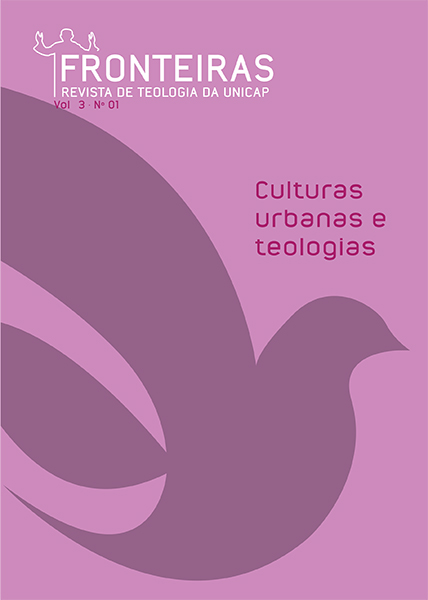The Ethical Dimension of Liturgy according to Paul Ricœur: A Liturgical Reading of “Amour et justice”
DOI:
https://doi.org/10.25247/2595-3788.2020.v3n1.p222-234Palavras-chave:
Anthropology. Golden Rule. Conscience. Bible. Practical wisdom.Resumo
In a community of faith called Church, liturgy supposes sacred times and spaces where people of God celebrate the mystery of Christ. But more than a celebration, liturgy is an ethical configuration of the person, who listens the words narratively and perceives the symbols esthetically, with the mystery of Christ’s life that reveals God and man at the same time. In order to understand liturgy, according to this central subject that is accepted academically in systematic theology and liturgical studies, we propose to consider the ethical dimension of faith as an anthropological mediation of the mystery celebrated in the worship. At the same time, to develop our research, we analyze in liturgical terms the book titled Amour et justice written by Paul Ricœur, considering the place of the Holy Scripture, especially the meaning of narratives of prophetical vocations in the configuration of the person, taking up his previous book Soi-meme comme un autre as a hermeneutical reference to understand the testimony and affirmation of the person, who goes from narratives to action in the praxis, that is to say to “the ontology of action”.
Downloads
Referências
Francisco Quesada-Rodríguez, « La rationalité théologique chez Paul Ricœur », Revista de Teologia da UNICAP : Fronteiras, Vol. 1, Num. 1, 2018, pp. 147-158.
Jean Greisch, L’herméneutique à l’école de la phénoménologie, (Paris : Beauchesne, 1995).
John Paul II, Address to the Participants of the International Paul VI Award Ceremony, Saturday, 5 July 2003.
John Wall - William Schweiker, Paul Ricœur and Contemporary Moral Thought (New York/ London: Routledge, 2002).
Joseph Verheyden – Theo L. Hettema – Pieter Vandecasteele, Paul Ricœur: Poetics and Religion, (Leuven/Paris, Uitgeverij Peeters, 2011).
Louis-Marie Chauvet, « Incidences de la pensée philosophique de P. Ricœur sur la théologie contemporaine », Le Portique, 26, 2011, pp. 1-12. Document 6, mis en ligne le 11 février 2013, consulté le 14 novembre 2013 dans http://leportique.revues.org/index2512.html
Louis-Marie Chauvet, « “Que l’Esprit Saint fasse de nous une éternelle offrande à ta gloire”. L’accomplissement éthique de la liturgie ». In : Luc Dubrulle et Catherine Fino (éd), Habiter le monde selon le désir de Dieu. Mélanges Médevielle, Paris, Desclée de Brouwer, 2015, p. 196-205.
Louis-Marie Chauvet, Symbole et Sacrement. Une lecture sacramentelle de l’existence chrétienne (Paris : Cerf, 1987).
Paul Ricœur, Amour et justice (Paris : Seuil, 2008).
Paul Ricœur, Oneself as Another (Chicago/London: University of Chicago Press, 1992).
Paul Ricœur, Soi-même comme un autre (Paris : Seuil, 1990).
Philippe Bordeyne and Bruce T. Morril (ed.) Sacraments: Revelation of the Humanity of God. Engaging the Fundamental Theology of Louis-Marie Chauvet (Minnesota: Liturgical Press, 2008).
Philippe Bordeyne et Bruce T. Morril (éd.) Les sacraments révélation de l’humanité de Dieu (Paris: Éditions du Cerf, 2008).
René Simon, Éthique de la responsabilité (Paris : Cerf, 1993).
Vicente Balaguer, “Paul Ricœur, Premio Internacional Pablo VI de 2003, Una teoría de la historia”, Anuario de Historia de la Iglesia, 13, 2004, p. 257-282.
Downloads
Publicado
Edição
Seção
Licença
Autores que publicam nesta revista concordam com os seguintes termos:
- Autores mantém os direitos autorais e concedem à Fronteiras - Revista de Teologia da Unicap o direito de primeira publicação, com o trabalho simultaneamente licenciado sob a Licença Creative Commons Attribution que permite o compartilhamento do trabalho com reconhecimento da autoria e publicação inicial nesta Revista.
- Autores têm autorização para assumir contratos adicionais separadamente, para distribuição não-exclusiva da versão do trabalho publicada nesta revista (ex.: publicar em repositório institucional ou como capítulo de livro), desde que reconheça e indique a autoria e a publicação inicial nesta Revista.
- Autores têm permissão e são estimulados a publicar e distribuir seu trabalho online (ex.: em repositórios institucionais ou na sua página pessoal) a qualquer momento depois da conclusão de todo processo editorial, já que isso pode gerar alterações produtivas, bem como aumentar o impacto e a citação do trabalho publicado (Veja O Efeito do Acesso Livre).























